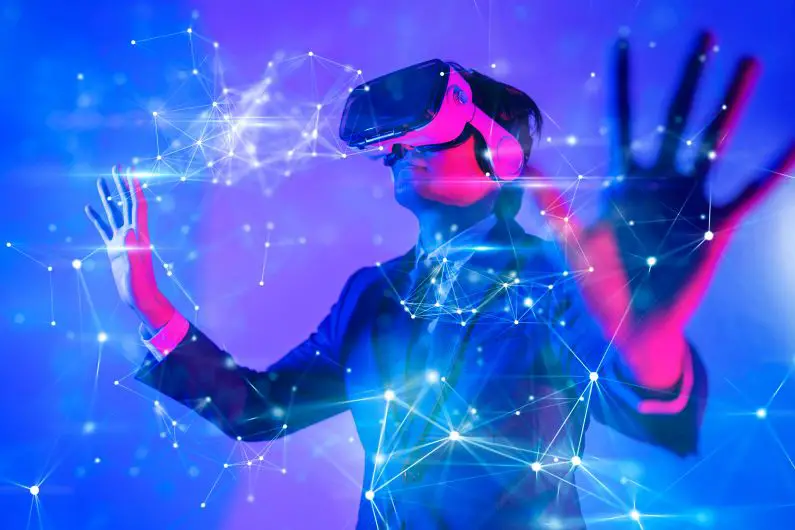Today, let’s dive headfirst into the exciting realm of Metaverse Gaming, a space where pixels meet possibilities and entertainment transcends the boundaries of the physical world. In this guide, you can get a lot of useful information about the metaverse and its potential. So buckle up because, by the end of this journey, you’ll understand the intricacies of Metaverse Gaming and gain insights into whether it’s just a realm of entertainment or a gateway to virtual life. Let’s embark on this adventure together!
The Evolution of Gaming in the Metaverse
Gaming’s evolutionary journey, marked by technological milestones, has seen a remarkable shift from early arcade games to today’s immersive experiences. The internet introduced multiplayer gaming, connecting players globally. However, the metaverse redefined the gaming landscape, offering a virtual shared space beyond traditional confines.
The emergence of the second life metaverse showcased the potential for a parallel universe, setting the stage for integrating it into gaming platforms. With the start of virtual reality and augmented reality, it transcended screens, immersing players in alternate realities. This fusion transformed gaming into a lifestyle where players actively participate in dynamic, virtual ecosystems.
Metaverse gaming goes beyond traditional limits, creating expansive, persistent virtual worlds that redefine player interactions. The transition signifies a paradigm shift, turning gaming into a social experience that blurs the lines between physical and digital. The evolution of gaming unfolds as a transformative journey where technology and imagination converge to shape the future of digital entertainment.
Social Dynamics
Gaming isn’t just about quests and achievements — it’s a thriving social landscape. Virtual communities spring up organically, creating digital societies where players from diverse backgrounds connect over shared interests. Beyond the pixels and avatars, these spaces foster friendships that often extend beyond the confines of the virtual realm, shaping real-world interactions.
The metaverse acts as a dynamic real-time communication and collaboration platform, with players forming bonds centered around common gaming experiences. These connections offer a sense of belonging and identity, transcending geographical barriers. However, the social dynamics come with challenges, including cyberbullying and privacy concerns. As gaming becomes a shared social experience, it’s crucial to navigate these challenges while appreciating the profound impact virtual interactions can have on real-world relationships.
Economic Opportunities and Challenges
Within the metaverse, a robust economic ecosystem thrives, fueled by in-game transactions and the vibrant trade of virtual assets. This parallel economy has tangible real-world effects as players actively buy, sell, and trade digital goods. It has transformed gaming into more than a leisure activity; it’s now where virtual entrepreneurship flourishes.
This digital frontier not only offers novel job opportunities but also sees the rise of virtual entrepreneurship. Players can monetize their skills by providing virtual services — from designing digital assets to offering in-game expertise. As a result, the metaverse becomes a viable platform for individuals to craft virtual careers, blurring the lines between leisure and livelihood.
Yet, these economic opportunities aren’t without challenges. Virtual crime, including fraud and theft within the metaverse, poses risks to the burgeoning digital economy. The impact of virtual economies on real-world finances raises questions about governance and regulation. Navigating this uncharted territory necessitates a delicate balance between fostering economic growth within the metaverse and addressing potential risks that could have far-reaching consequences.
Educational and Professional Development
Metaverse gaming isn’t just about entertainment — it’s a frontier for educational and professional growth. Virtual environments within the metaverse redefine traditional learning by offering immersive platforms for educational institutions. Students transcend geographical constraints through virtual classes and collaborative projects, engaging in interactive simulations that enhance the learning experience.
The metaverse also serves as a dynamic arena for skill development and training. Beyond traditional learning methods, virtual environments offer practical training grounds for various professions, such as healthcare and architecture. Players can refine problem-solving skills, elevate critical thinking abilities, and simulate real-world scenarios, providing a valuable supplement to formal education. Its transformative impact on education and professional development is increasingly evident, opening up new opportunities for immersive learning.
Ethical Considerations and Concerns
Metaverse gaming introduces exciting possibilities and raises ethical questions that warrant careful consideration. One significant problem is the potential for addiction and escapism, where the immersive nature of the metaverse can lead individuals to prioritize virtual experiences over real-world responsibilities. Striking a balance between the two realms becomes a critical ethical challenge, emphasizing the need for mindful engagement.
The impact of prolonged engagement in the metaverse on mental health is a pressing concern. Social isolation and deteriorating mental well-being may arise as individuals immerse themselves in virtual experiences. Establishing guidelines and promoting responsible engagement within the digital realm is crucial to ensure that its benefits do not compromise participants’ overall well-being.
Conclusion
In the ever-expanding realm of metaverse gaming, we’ve explored a landscape where entertainment transcends traditional boundaries. It affects virtual communities, economic ecosystems, and transformative educational experiences. As we embrace the potential of this digital frontier, it’s essential to navigate its nuances responsibly.
While such gaming opens new horizons, ethical considerations underscore the need for mindful engagement. Striking a balance between immersive experiences and real-world responsibilities is paramount to positively impacting individuals’ well-being. As the metaverse evolves, let us embrace its potential while acknowledging and addressing its ethical challenges.






![YouTube SEO in 2024 [Definitive Guide]](https://getpixie.com/wp-content/uploads/2024/02/shutterstock_1684828252-1-150x150.jpg)








